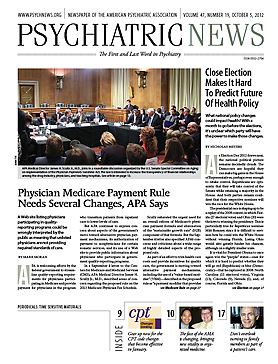For 38 years, APA has conducted the Minority Fellowship Program, which has been financed by the federal Substance Abuse and Mental Health Services Administration.
The heart of the program is to “enhance the capabilities of racial and ethnic minority psychiatry residents to provide culturally competent, evidence-based, recovery-oriented mental health and substance use disorder treatment to minority individuals,” Marilyn King, assistant director of the program, explained during a recent interview. However, the program also attempts to boost such residents’ leadership and policymaking abilities, as well as their expertise in areas of psychiatry that are of special interest to them.
Once residents have been selected as fellows, they are assigned mentors, receive special leadership training, and are assigned to one of APA’s councils, “where they can sit with the experts and work on policy that affects the field of psychiatry,” King said. Moreover, their expenses are covered to attend both the APA annual meeting and the Institute on Psychiatric Services, where mentoring breakfasts are provided for them and where they can learn to deliver presentations at workshops organized especially for them.
The fellowship also makes additional funds available to them, “and there are a host of things they can do with their funding”—for instance, use it to finance a research project, attend a conference of special interest to them, or do a grand-rounds presentation.
One of the 22 fellows who have been selected for the 2012-2013 term is Andrea Brownridge, M.D., J.D., of Hampton, Ga. Brownridge has an eclectic academic background. She received a B.S. in industrial engineering from the Georgia Institute of Technology. She earned a medical degree at Rosalind Franklin University of Medicine and Science and received a law degree from Georgia State University. She is currently a psychiatry resident at Morehouse School of Medicine.
“I am interested in advancing the integration of law and medicine to better inform and counsel patients, adjudicators, and the medical and legal professions generally,” Brownridge told Psychiatric News. “I look forward to growing as a leader in psychiatry by attending conferences, securing mentorship, and gaining leadership training. I will serve on the APA Council on Psychiatry and Law and aspire to advance the forensic psychiatry curriculum available to psychiatry residents nationwide.”
Another of the fellows who have been selected for the 2012-2013 year is Benjamin Angarita, M.D., a psychiatry resident at Mount Sinai School of Medicine in New York. His professional goal, he explained, is to become an academic child and adolescent psychiatrist. He applied for the fellowship, he said, “to increase mental health services to the Latino population in Spanish Harlem.”
As a part of his fellowship, he added, he is going to make a “grand-rounds presentation related to Latino mental health,” attend a National Institutes of Health health-disparity summit in November and a world psychiatry conference later this month. And what he expects to get out of the fellowship, he stated, “is a rich clinical experience as well as a formalized academic exposure to barriers to accessing psychiatric services in the Latino community.”
A third fellow selected for 2012-2013 is Enrico Castillo, M.D., of Columbia University. “I am interested in cross-cultural psychiatry, public psychiatry, and psychodynamic psychotherapy,” he said. “I envision having a practice that focuses on mental health for underserved, publically funded Asian Americans, as well as a private practice for psychodynamic therapy.”
He continued, “I have known since medical school that the fellowship is a great opportunity to develop an expertise in minority mental health issues and to connect to leaders in the field.” He added that he wants to use the fellowship “to develop an Internet resource library targeting residents and clinicians focused on issues in Asian-American psychiatry.” Driving him to this goal was “the realization that in residency programs around the country, there is variable access to education on cross-cultural issues and to patients from diverse backgrounds. I hope to make this kind of information more widely accessible using an online medium.”
Also selected this year is Ellyn Johnson, M.D., of Georgia Health Sciences University. “I pursued the fellowship because I was forgetting why I chose psychiatry in the first place,” she explained. “Residency is a very stressful period, and surviving the day-to-day grind made it difficult to remember my passion for psychiatry and my career goals beyond this period of training. The fellowship offers me an opportunity to return to that feeling of wonder and pursuit of exploration that drew me to psychiatry in medical school.”
“I expected to meet a lot of great people and gain exposure to new ideas and ways of delivering care,” Johnson continued. “I hope to collaborate on progressive projects that broaden my skill sets and improve mental health care in my community.”
Johnson’s professional goals, she pointed out, “include returning to service in the United States Air Force upon completion of my psychiatry residency. I hope to bridge my varied interests in military psychiatry and public psychiatry by pursuing a career involving policymaking and other areas of psychiatry that are applicable at the organizational and systems levels.”

